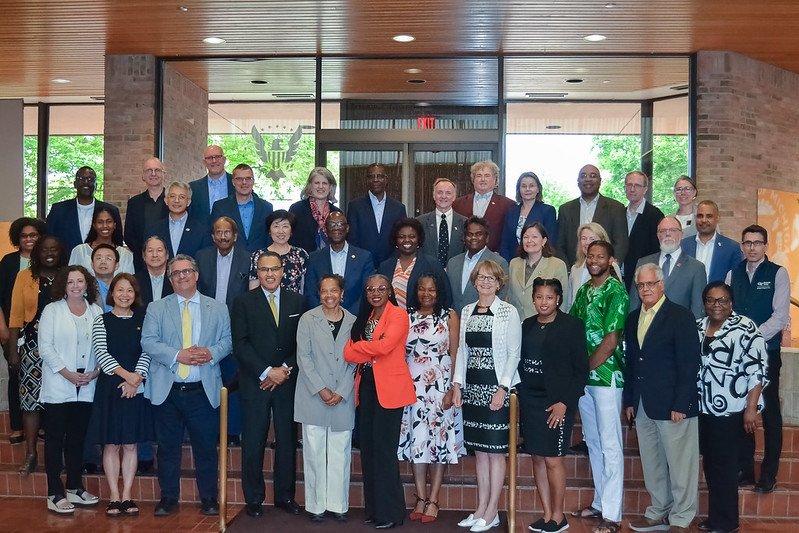December 3, 2024 – Hampton, VA – In an effort to strengthen the U.S. science and technology workforce, a coalition of engineering leaders from Historically Black Colleges and Universities (HBCUs) and major research institutions recently released a report on how to work together to expand research programs at HBCUs.
Joyce T. Shirazi, dean of the School of Engineering, Architecture and Aviation at Hampton University, co-led the effort.
The recommendations emerged from the HBCU Engineering Deans Summit, a first-of-its-kind gathering earlier this year organized by the HBCU Engineering Deans Council and hosted by the University of Michigan College of Engineering. It brought together more than 30 leaders from HBCUs, Research 1 (R1) institutions and several funding agencies to discuss better ways to partner and support boosting HBCUs’ research capacity.
“The report offers a roadmap for navigating collaborations between institutions that, while different in significant ways, are often working toward common goals,” said Shirazi, who co-chaired the Summit.

Among the recommendations are: harnessing the breadth of perspectives to develop innovative new research directions that disrupt the status quo; working together on curriculum, teaching and advising to build more time for research at HBCUs where faculty have higher teaching loads; and advocating for more equitable distribution of research funding.
R1 institutions produce the lion’s share of university-based research and PhD’s in the United States. They also get most of the research funding. At present, none are HBCUs. That’s expected to change next year, with several likely to be added under the latest criteria. Summit participants hope it’s a turning point.
“For the sake of a secure national economy, a strong research workforce, and an innovative scientific enterprise that serves everyone, our HBCUs need dynamic research programs that offer graduate degrees and set students up for leadership roles. We can’t afford to leave talent on the table,” Shirazi said.
Despite making up less than 3% of U.S. colleges and universities, HBCUs produce nearly 25% of Black science, technology, engineering and math (STEM) bachelor’s graduates, and provide the undergraduate education for one-third of Black STEM students who go on to earn doctorates. Their outsized impact is expected to grow due to shifting enrollment patterns in the wake of the ban on considering race in admissions and potential impacts of the political landscape.
“We’ve come up with real, actionable steps that we believe can benefit everyone. They can help address the country’s looming STEM talent shortage. They’re responsive to the surges in HBCU enrollment we’re beginning to see since the ban on affirmative action. And they can keep the U.S. at the forefront of innovation,” said Lola Eniola-Adefeso, who co-chaired the Summit as Michigan Engineering’s associate dean for graduate and professional education. In October, she became dean of the University of Illinois Chicago College of Engineering.
The recommendations are organized into four steps:
- Understand: Set a foundation for meaningful collaboration by learning about one another. Spend time at each others’ institutions through short visits, sabbaticals or teaching exchanges, for example.
- Align: Recognize shared motivations and common goals to build trust and momentum. Identify unique strengths and leverage them from both sides—for example the vast research infrastructure of R1s and the high educational support cultures of HBCUs.
- Partner: Harness the variety of perspectives to identify new research directions that spark innovation or challenge the status quo. Work together on curriculum, teaching and advising, as well as making the case to HBCU students that careers in research are worthwhile.
- Sustain: Build bandwidth for the time and care that authentic partnerships require. Advocate for equitable funding—HBCUs comprise 3% of US colleges and universities, yet received just 1.48% of federal science and engineering research funding in 2022. Given the different educational support cultures, ensure support for HBCU students on R1 campuses. Enhance lab infrastructure at HBCUs.
The report includes numerous tactics for implementing each recommendation, as well as a section acknowledging difference and bias that participants identified during the Summit. It also acknowledges systemic factors that give more research intensive universities an advantage—chief among them are the well-staffed research offices that guide faculty through the award process from start to finish.
“We know there are great ideas everywhere,” Eniola-Adefeso said. “Through this work, one of our goals is to set up a system that brings them to light.”
Elevating Hampton Excellence
Hampton University’s Elevating Hampton Excellence initiative is a bold, 10-year strategic plan designed to advance academic rigor, spark innovation, and deepen community impact. Rooted in Hampton’s legacy of excellence, this transformative effort seeks to expand educational opportunities, drive pioneering research, and empower students to lead boldly in their chosen fields. At its heart is a commitment to reimagining education through cutting-edge programs, fostering breakthrough discoveries, and forging strategic partnerships with industry leaders. By focusing on securing patents, advancing STEM innovation, and addressing global challenges, Hampton is positioning itself as a leader in shaping the future of science, technology, and society.
This initiative emphasizes creating an inclusive environment where every student can excel while advancing social mobility and community uplift. By unlocking the collective potential of its students, faculty, and alumni, Elevating Hampton Excellence embodies Hampton’s mission to transform lives and build a legacy of global impact. Through visionary leadership, innovation, and collaboration, Hampton University is redefining what’s possible in education and research, ensuring its place as a trailblazer in empowering the next generation of leaders and change-makers.
About Hampton University
Hampton University, nestled along the scenic shores of Hampton, Virginia, is a dynamic historically Black institution with a storied legacy of academic excellence, pioneering research, and dedicated community service. Here, students discover an empowering environment that fuels their ambitions, nurtures their potential, and inspires them to rise, lead, and excel.
Founded in 1868, Hampton combines a robust liberal arts education with a strong emphasis on scientific and professional disciplines, offering a wide range of distinctive programs, including leading-edge degrees in STEM, business, arts, and health sciences. The University is at the forefront of research in areas such as atmospheric science, cancer treatment, and cybersecurity, driving innovation that impacts the world. Additionally, the newly launched School of Religion stands out as the first HBCU to offer a doctoral degree in theology, religious studies, and ministry. Contributing $530 million annually to both the regional and the Commonwealth of Virginia’s economy, Hampton plays a vital role in regional development while championing diversity, inclusion, and opportunity.
Recognized by Money Magazine as one of the “Best Colleges in America” and honored by Coastal Virginia as the “Best Private College,” Hampton University is a close-knit community of learners and educators representing 44 states and 32 territories and nations. Committed to nurturing intellectual curiosity, critical thinking, and global citizenship, Hampton prepares its students to lead and thrive in an evolving world. For more information, visit www.hamptonu.edu.
For media inquiries, please contact Mahogany Waldon in the Office of University Relations, at mahogany.waldon@hamptonu.edu or 757-727-5987.
![]()
